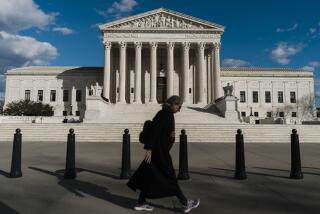Blackmun Lifts Ban on CBS Tape of Tainted Meat
- Share via
WASHINGTON — Supreme Court Justice Harry A. Blackmun on Wednesday lifted a state court order forbidding broadcast of an unauthorized videotape, allowing CBS News to go ahead with its hidden-camera news report showing tainted meat at a South Dakota packing plant.
Acting hours before the program “48 Hours” was scheduled to go on the air, Blackmun stressed that the First Amendment bars judges from blocking the media from reporting the news.
“For many years, it has been clearly established that any prior restraint on expression comes to this court with a heavy presumption against its constitutional validity,” he wrote.
But those past high court pronouncements did not stop a South Dakota judge or the state Supreme Court from ordering CBS not to air the program.
“The economy of western South Dakota would be severely damaged” if the network broadcast excerpts from the videotape, which included scenes of fecal matter on cut pieces of meat, Judge Jeff W. Davis said in a Jan. 25 order.
On Tuesday, the state Supreme Court upheld the judge’s order.
CBS filed an emergency appeal with Blackmun, who reviews such requests from the states of the upper Midwest.
CBS reporters had obtained a secret videotape from an employee at the Rapid City plant. Portions of the videotape were to air Wednesday night as part of a segment on contaminated beef.
Lawyers for CBS noted that the company, Federal Beef Processing Inc., was tagged with more than 600 citations last year for violating U.S. Agriculture Department regulations.
“The sanitary quality of the meat we eat every day in restaurants and fast-food stores is a matter of surpassing national interest,” the network maintained.
Company lawyers said the dispute did not involve the First Amendment, but rather “the illegal obtaining of a videotape.”
“Far from being a prior restraint on free speech, this case involves the taking of trade secrets by CBS, the photographing of the unique processes and methods” used by the firm to process its beef, an attorney for the company said.
Davis agreed with the company’s arguments.
More to Read
The biggest entertainment stories
Get our big stories about Hollywood, film, television, music, arts, culture and more right in your inbox as soon as they publish.
You may occasionally receive promotional content from the Los Angeles Times.











